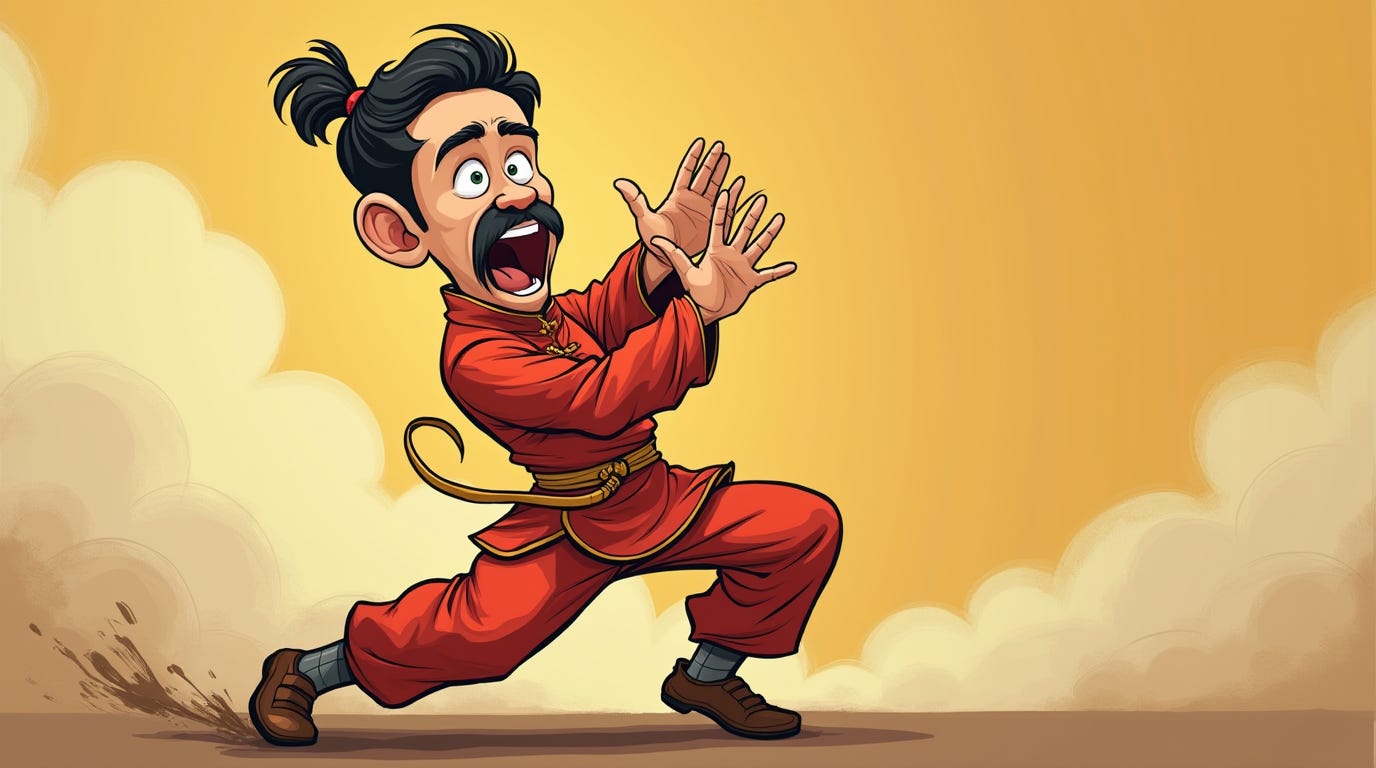The dumbest objections against statelessness #10
"But what if I'm attacked?" - Objecting incentive over threat
In the post ‘Incentive-based order without government,’ I argued that the encouragement of desired behaviours is not the same as discouraging undesired ones.
For discouraging aggression, there is something called FAFO, which is neither a threat nor an incentive; it’s a warning and a consequence.
Even though you can still provide incentives to make undesirable behaviour and aggression less desirable, you still retain the right to respond to aggression using defensive or reciprocal violence. The implied warning is that you can defend yourself against a threat and seek reciprocal aggression if you are harmed. This is not a threat nor an incentive. It’s a consequence.
Straw man
To straw-man stateless voluntaryism by mischaracterising incentive-based systems of self-governance as somehow “unable” to tackle aggression is simply ludicrous. If anything, the only entity limiting the dispensing of real justice is the government, which deliberately protects the worst corrupt psychos, sick pedophiles, and genocidal murderers. The only illusion of safety or justice you get from the state is just to keep the livestock from harming each other, much like a rancher protects the cattle from infighting. The state does not love you. The state needs you to be healthy enough to exploit you.
The straw-man objection against statelessness goes like this: “But what if someone attacks you? How are you going to incentivise them not to attack you? What are you going to do then without a government to protect you?”
The first problem with this line of questioning is its assumption that a threat-based government somehow protects you from aggression. It doesn’t. The vast majority of violent crimes occur on government-managed land. A violently imposed monopoly of policing and security means there is no free-market incentive for them to be effective or efficient, or - most importantly - accountable. This is why police are not only useless, they are dangerous to peaceful people who never bother anyone.
Also, the consolidation of police and military power into a centralised monopoly of violence can only invite and magnify aggression that would otherwise not occur in a free market of security forces where all are accountable to and punishable by the relentless free market. If anything, the government disarms you or, at best, limits your ability to use defensive force to the point where your defensive power is almost non-existent. Sure, there would still be aggression without government; just less… much less. If you doubt that, re-read this paragraph.
The second problem with this objection is that incentives are there to promote desired behaviours, not to discourage undesired behaviours. Instead, the right to self-defense and reciprocal aggression is there to discourage bad behaviours. See ‘Punishing criminals in the absence of a state’ for context.
However, in a stateless voluntaryist society that is self-governed through incentives, there is a way to incentivise people to avoid bad behaviours: there would be rewards for not being aggressive, like access to cheap insurance, since your track record proves you to be less of a risk. It’s logical, and it already occurs today in the minimal free market we have left. Read ‘Laws without government’ for context.
Revelation
The “who will defend me from aggression?” straw man is usually a projection. It’s what those people making it would do if they felt that there would be no punishment for violence. They judge others by their own standards; they imagine statelessness to be a free-for-all, which it isn’t. So, in a free-for-all, they’d commit all kinds of atrocities, because the only thing stopping them from committing evil is the threat of punishment. So, they assume everyone else will do that. This is why they fear statelessness: they erroneously imagine it as a society without rules and without punishment.
What they don’t get is that, without government, aggression would be more appropriately punished, without any government to protect criminals, and without punishments being pointless or inhumane. Punishments should hold the element of correction and satisfaction through providing reparations, otherwise, sadistic punishment (like prison) only conditions criminals to be even more vicious.
Look at the people who make this hopelessly insane straw man, and look at how they are more likely to use aggressive violence to begin with. They are likely the types of people who believe in arbitrary aggression, and who find ways of baptising it as somehow “defensive violence” via a very slippery slope. They eagerly anticipate a chance to use violence and get away with it. Perhaps this is why they object to statelessness… they know that they would not be able to get away with a crime without a government to protect them.
Incentive vs. threat vs. deterrence
This is the level of indoctrination I have to address daily when I present arguments that people have never heard in school or on TV.
When I say “incentives are a better predictor of human behaviour than threats,” for everyone who can understand English, I mean that incentives MOTIVATE people to take specific action more than threats. Through incentives, people choose to adopt desired behaviours voluntarily, and they are rewarded for it, instead of just reluctantly complying just to avoid punishment. Nowhere in this sentence did I suggest that incentives DETER people more than threats. It’s one thing to predict what people will DO rather than preventing them FROM DOING something. In no way do I suggest that you can never use defensive violence when faced with aggression of any kind.
If anything, the main reason why I oppose the state is that I want criminals to be punished more deservingly, more appropriately, and more efficiently. The state does not punish criminals fairly, and it also takes away your right to seek justice whenever it lets them off the hook. The state forces you, the victim, to pay for your abuser to live rent-free in concentration camps (prisons) where he is trained to be more aggressive and indignant. This isn’t punishment: this is deliberate conditioning for more criminality, all at your expense. The “punishment” here does not give you reparations, nor does it promote rehabilitation in the criminal.
The state also creates “criminals” out of victimless “crimes” while dealing a slap on the wrist to pedophiles, war criminals, and terrorists. And it makes you a criminal for wanting to take justice into your own hands when it fails to do so appropriately (Marianne Bachmeier or Gary Plauché, for example. See ‘How will justice be served in the absence of a government?’ for context.


The bottom line
Incentives are better than threats when you want people to take the action that you want. Yes, incentives can also deter people from aggressing against you, only if they are rewarded for not being aggressive, as I explain in ‘State vs. Statelessness’ or ‘How I know statelessness works [Part 2].’
But there will always be people who don’t know what’s best for them, or who see their short-term immediate gain at the expense of their long-term good standing with their society. These people already exist under a state, so I fail to see how the government’s threats of violence can deter them either.
In no way do I suggest that, via incentives, you relinquish your right to defensive violence whenever incentives fail with illogical people. But you have to let incentives work first, and work they do in the vast majority of cases.
Already, we see a vibrant society where products are spontaneously manufactured and distributed, with millions of people’s input required, just so you can get a coffee with your laptop using WiFi while enjoying a snack. Do you think anyone threatened these people to organise to provide all these services? Do you think a government designed and planned every single action necessary for the production of the goods and services you enjoy daily?
It is all incentive; all of it.
Free markets are more efficient and effective due to incentive being their driving force - they are rewarded for their input, and they are held accountable whenever they fail to satisfy free-market demand, as long as the market is truly free without state interventionism. Centrally planned markets (mixed “democratic” systems, socialism, communism) are inefficient and ineffective because people reluctantly comply with threats of violence - they reluctantly adopt a behaviour just to avoid punishment.
Incentives, however, drive human ingenuity and aspiration. You work harder when you are driven by a carrot rather than a stick. This is why China’s economy boomed the second the communist state loosened its grip on the market, thus allowing significant free deregulated enterprise; in many ways, freer than any Western, supposedly “free” economy.
Incentives work. Threats work for now.
Check out my series ‘The dumbest objections against statelessness’
Thank you for reading. I appreciate your time. All my work here is free.
Like, comment, share, or subscribe for free… or not. It’s all the same.
Recommended reading
‘Chaos Theory: Two Essays on Market Anarchy’ by Robert P. Murphy
‘No Treason: The Constitution of No Authority’ by Lysander Spooner
‘For a New Liberty: The Libertarian Manifesto’ by Murray N. Rothbard
‘Power and Market: Government and the Economy’ by Murray N. Rothbard
‘Man, Economy, and State with Power and Market’ by Murray N. Rothbard
‘The Enterprise Of Law: Justice Without The State’ by Bruce L. Benson
‘The Machinery of Freedom: A Guide to Radical Capitalism’ by David Friedman






